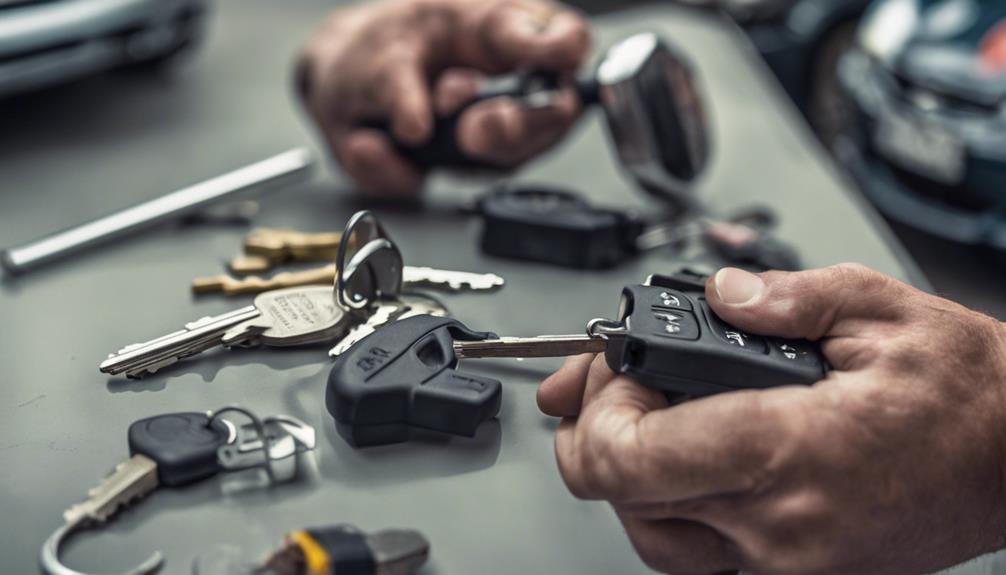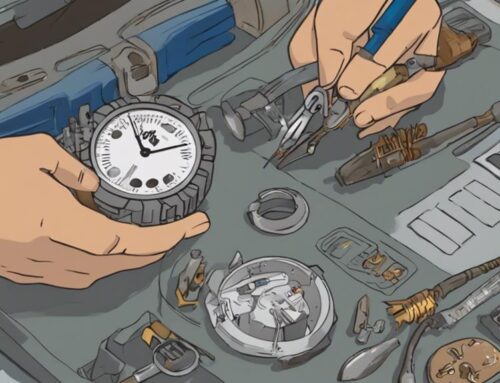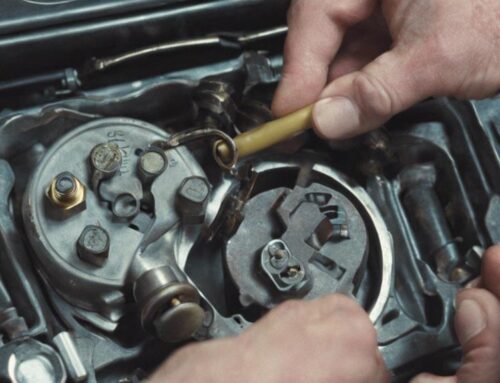You might find yourself needing ignition rekeying more often than you'd expect, and understanding the common triggers can help you avoid the hassle. Lost or stolen keys, damaged components, and unwanted duplications are just a few culprits. By adopting proactive measures, like enhancing your key management and maintaining your ignition system, you can greatly reduce the risk. However, even the best precautions might not cover every scenario. So, what steps can you take to guarantee your vehicle's security remains intact?
Key Takeaways
- Common reasons for ignition rekeying include lost or stolen keys, broken ignition cylinders, unwanted key duplication, and changes in vehicle ownership.
- To prevent ignition rekeying, consider implementing a robust key management system and using high-security keys that resist duplication.
- Regular maintenance, including lubrication and inspections, can help identify and resolve ignition lock issues before they necessitate rekeying.
- Always replace worn keys to ensure proper functionality and security of the ignition system, reducing the risk of ignition problems.
- Engage professional locksmith services for routine checks and assistance, enhancing overall vehicle security and preventing future ignition complications.
Understanding Ignition Rekeying

Understanding ignition rekeying involves grasping its purpose and process. This procedure primarily enhances ignition security by altering the internal mechanisms of your ignition lock to accept a new key. When you rekey, you're effectively managing your keys, ensuring that only authorized users can access and start your vehicle. This is critical when you suspect unauthorized access or if your key management practices have been compromised. Rekeying involves disassembling the ignition cylinder, replacing the pins or tumblers, and reassembling the lock to match the new key's cuts. By doing this, you mitigate risks associated with lost or stolen keys, providing you with greater control over your vehicle's security. Fundamentally, ignition rekeying empowers you to maintain robust key management and safeguard your assets.
Lost or Stolen Keys
If you've lost your car keys or suspect they may have been stolen, rekeying your ignition is an essential step to enhance your vehicle's security. This process involves changing the internal pins of your ignition cylinder, ensuring that any old keys can no longer access your vehicle. By addressing key security immediately, you greatly reduce the risk of theft.
To prevent future incidents, consider investing in key management systems or smart locks that provide enhanced theft prevention measures. Regularly assess your key storage practices and remain vigilant about where you leave your keys. Remember, proactive steps in key security not only safeguard your vehicle but also give you peace of mind, empowering you to maintain control over your assets.
Broken or Damaged Ignition Cylinder

How can you tell if your ignition cylinder is broken or damaged? Look for signs like difficulty turning the key, a key that won't insert, or unusual noises during ignition. These issues are essential in ignition troubleshooting, as they often indicate internal damage. If you experience any of these symptoms, it's wise to act quickly. Performing a cylinder replacement may be necessary to restore your vehicle's function. Ignoring these warning signs can lead to more severe problems and costly repairs down the line. Regular maintenance checks can help prevent ignition cylinder failure, ensuring your key operates smoothly. Stay proactive to avoid the hassle of rekeying and maintain the power and security of your ignition system.
Understanding the Locksmith Process for Ignition Cylinder Repair
Unwanted Key Duplication
Unwanted key duplication is a significant concern for vehicle owners, as it can compromise the security of your ignition system. When unauthorized copies of your keys exist, you face substantial duplication risks that could lead to vehicle theft or unauthorized access. To safeguard your key security, consider the following measures:
- Use high-security keys designed to resist duplication.
- Change your locks if you suspect key theft.
- Limit key access to trusted individuals only.
- Regularly inspect your ignition system for signs of tampering.
- Engage a professional locksmith for rekeying if necessary.
Enhancing security by rekeying locks after a break-in is vital to guarantee previous keys no longer provide access, as explained in a recent post on enhancing security.
Vehicle Ownership Changes
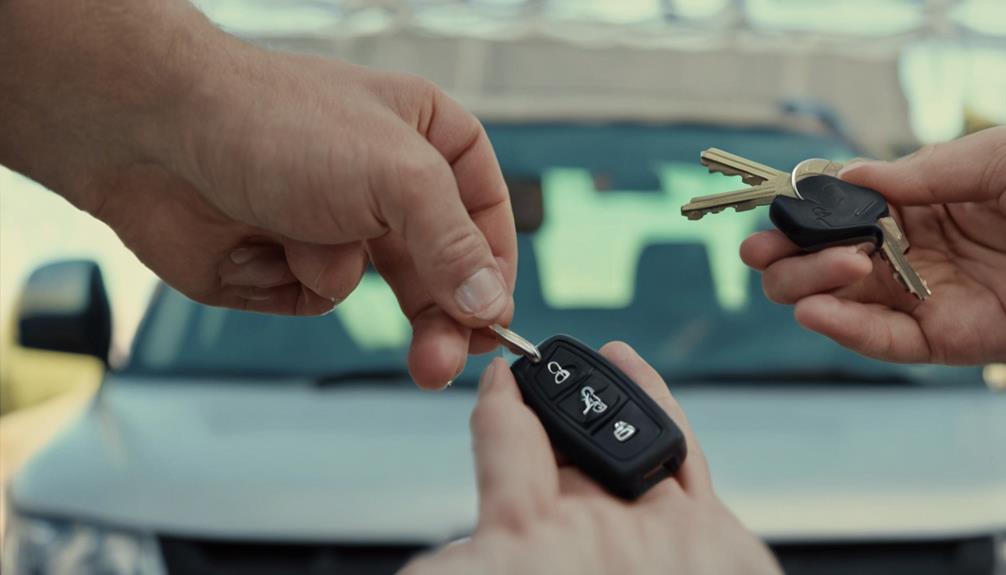
When you acquire a new vehicle, it's essential to contemplate the security of your ignition system, especially if the previous owner or other individuals might still have access to the keys. During ownership transfer, understanding the vehicle history is important. You may not know how many keys were made or who might have duplicates. This uncertainty poses a significant risk to your vehicle's security. To safeguard against potential theft or unauthorized access, rekeying the ignition is a wise move. By changing the ignition locks, you guarantee that only you hold the keys, enhancing your control over the vehicle. Taking this proactive step not only secures your investment but also empowers you to drive with confidence, knowing your vehicle is protected.
Ignition Lock Issues
Ignition lock issues can greatly impact your vehicle's performance and security. You might notice common problems like difficulty inserting the key or turning the ignition, which often indicate signs of wear. To prevent these issues, it's essential to implement regular maintenance checks on your ignition system.
Common Ignition Problems
Often, drivers encounter various ignition lock issues that can lead to frustration and inconvenience. Understanding these common problems is vital for effective ignition troubleshooting. Here are some prevalent ignition lock issues you might face:
- Stuck ignition key
- Difficulty turning the key
- Ignition switch failure
- Worn or damaged key
- Misalignment of the ignition cylinder
When you experience these issues, prompt key replacement may be necessary to restore functionality. Regular maintenance can help you avoid these common ignition problems. By recognizing the signs early and addressing them, you can prevent further complications and guarantee your vehicle operates smoothly. Stay proactive, and you'll maintain control over your ignition system, minimizing future disruptions and enhancing your driving experience. Learn more about how locksmiths can fix ignition switches in any vehicle to guarantee you have the necessary information for dealing with ignition-related issues.
Signs of Wear
Wear and tear in your ignition lock can manifest in several distinct signs that indicate it is crucial to seek attention. If you notice difficulty inserting or turning your key, this could signal internal wear. A sticky or unresponsive ignition switch can compromise your ignition security. Additionally, if your key feels loose or wobbles in the lock, you may require key replacement to prevent further issues. Strange noises, such as grinding or clicking when engaging the ignition, are also critical indicators of potential failure. Ignoring these signs can lead to complete lock malfunction, leaving you stranded. To maintain your vehicle's performance and security, address these symptoms promptly and consider consulting a professional for a thorough assessment. It is crucial to understand these signs to prevent costly Ignition Switch Repair and Replacement Costs in the future.
Preventative Maintenance Tips
To keep your ignition lock functioning smoothly and avoid potential issues, you should implement a regular maintenance routine. Following a maintenance checklist will enhance the longevity and reliability of your ignition system. Here are some preventative measures to take into account:
- Inspect the ignition key for wear and tear.
- Clean the ignition lock using a suitable lubricant to prevent jamming.
- Check battery connections to guarantee proper electrical flow.
- Monitor for unusual sounds or resistance while turning the key.
- Schedule professional inspections periodically to identify hidden issues. It's also essential to be aware of common problems and causes of ignition switch failure, as detailed in a helpful resource on troubleshooting ignition switch failures. Troubleshooting Ignition Switch Failures
Wear and Tear Over Time
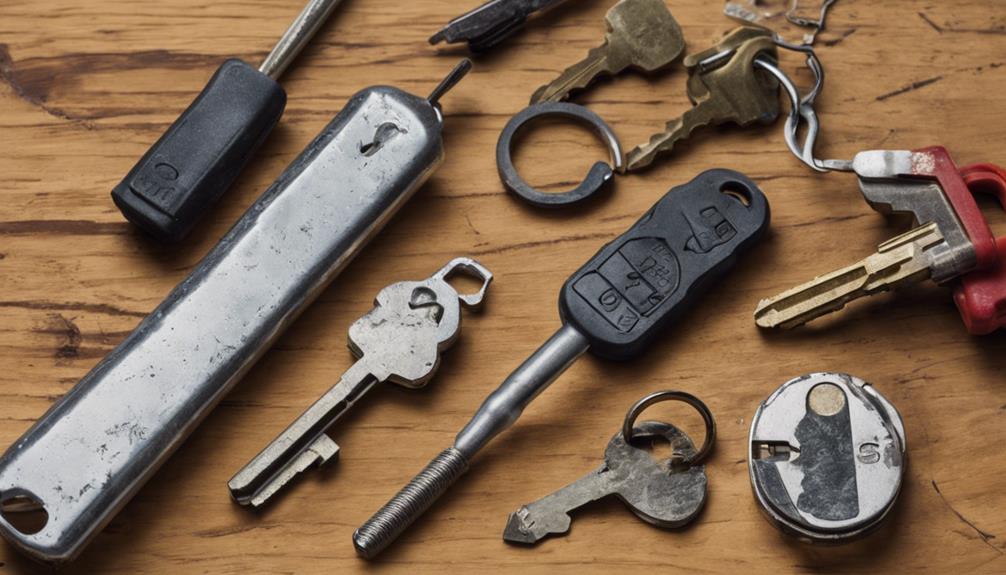
Over time, regular use of your ignition system can lead to key insertion difficulty and ignition cylinder malfunction. These issues are often signs of wear and tear, which can compromise your vehicle's security and functionality. Regular maintenance is essential to prevent these problems and guarantee your ignition operates smoothly.
Key Insertion Difficulty
After years of use, you may find that inserting your car key becomes increasingly difficult. This challenge often stems from wear and tear, particularly issues with key alignment and faulty tumblers within the ignition cylinder. As these components degrade, the precision required for smooth key insertion diminishes.
To mitigate this problem and maintain peak functionality, consider the following:
- Regularly lubricate the ignition cylinder.
- Inspect the key for any signs of wear.
- Verify the key is properly cut and shaped.
- Avoid excessive force when inserting the key.
- Seek professional assistance if you notice persistent issues.
Ignition Cylinder Malfunction
How often do you consider the impact of wear and tear on your ignition cylinder? Over time, frequent use leads to ignition issues that can compromise your vehicle's performance. The internal components can degrade due to friction and exposure to the elements, resulting in a malfunctioning cylinder. You might notice symptoms like difficulty turning the key or intermittent starting problems. If these issues persist, a cylinder replacement may be necessary to restore functionality and guarantee reliable ignition. Ignoring these signs can lead to more severe problems down the line, including complete ignition failure. Stay vigilant and proactive about the condition of your ignition cylinder to avoid costly repairs and maintain your vehicle's power. To learn more about fixing a malfunctioning ignition cylinder, check out Fixing a Malfunctioning Ignition Cylinder: What to Do.
Regular Maintenance Importance
Regular maintenance is essential to guarantee your ignition system operates smoothly, as neglecting it can lead to significant wear and tear over time. By performing routine inspections and prioritizing key care, you can extend the life of your ignition components and prevent costly rekeying issues. It's important to inspect the ignition cylinder regularly for signs of wear and consider the role of the ignition switch in the system's functionality. Lubricate key mechanisms to assure smooth operation, check the battery condition to avoid ignition failures, keep keys clean and free of debris to prevent jamming, and replace worn keys before they damage the ignition system.
Tips for Prevention
To prevent the need for ignition rekeying, it is essential to maintain vigilance over your vehicle's security. Start by ensuring your key security is robust; avoid leaving spare keys in accessible locations. Regularly inspect your keys for wear and tear, replacing them before they become problematic. Consider upgrading to a smart key system, which offers enhanced security features. Engage professional locksmith services for routine checks and maintenance, ensuring any vulnerabilities are addressed promptly. Additionally, always lock your vehicle and invest in an alarm system to deter potential theft. By implementing these strategies, you not only protect your ignition but also enhance your overall vehicle security, minimizing the risk of costly rekeying in the future. It's important to stay proactive in safeguarding your vehicle, especially considering the potential security risks associated with outdated key systems and neglecting maintenance (Understanding Car Ignition Rekeying vs. Replacement).
Low Rate Locksmith Services

While you might think that all locksmith services charge exorbitant fees, many provide affordable solutions without compromising quality. By choosing a locksmith with a solid reputation, you guarantee effective and reliable service at competitive rates. Here are some aspects to take into account when searching for low-rate locksmith services:
- Extensive service offerings
- Transparent pricing structures
- Positive customer reviews
- Quick response times
- Licensed and insured professionals

